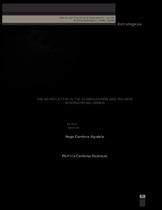Mostrar el registro sencillo del ítem
El estado-nación en la globalización y en el reordenamiento internacional
| dc.contributor.author | Cardona Agudelo, Hugo | |
| dc.contributor.author | Cardona Restrepo, Porfirio | |
| dc.coverage.spatial | Seccional Medellín | spa |
| dc.date.accessioned | 2021-01-22T18:40:27Z | |
| dc.date.available | 2021-01-22T18:40:27Z | |
| dc.date.issued | 2011 | |
| dc.identifier.issn | 1794-8347 | |
| dc.identifier.uri | http://hdl.handle.net/20.500.11912/7558 | |
| dc.description | p. 75 - 87 | spa |
| dc.description.abstract | El Estado-nación ha sido un tema recurrente en los distintos debates académicos a finales del siglo XX y principios del XXI, dada su importancia y pertinencia en el ordenamiento político de las instituciones en Occidente, lo que ha generado posturas a favor y en contra de su permanencia. Ante esta disyunción, el objetivo de la investigación ha sido identificar el contexto económico y político en el que surge el problema a fin de clarificar la situación. A partir de un ejercicio interpretativo de la teoría política y económica, la tesis central en este escrito es que el Estado-nación en el contexto de la globalización después de la caída del Muro de Berlín no desaparecerá en un futuro cercano; no obstante, los elementos estructurales que lo componen se ajustarán a las circunstancias y desafíos que se le impone en la reconfiguración del orden internacional. | spa |
| dc.description.abstract | The Nation-State has been a recurrent topic in diverse academic debates, at the end of the twentieth century and the onset of the twenty-first century, given its importance in the political constitution of Western institutions; which has generated mixed positions about its existence. Given such disjunction, this study aims to identify the economic and political context in which the mixed positions arise to clarify the circumstances. The main thesis of this study, which is based on an interpretative exercise of economic and social theory, of this study affirms that the Nation-State, which was set with the fall of the Berlin Wall, will not disappear in the near future and that its structural elements will adjust to the new circumstances and challenges of the new international order. | spa |
| dc.format.mimetype | application/pdf | |
| dc.language.iso | spa | |
| dc.publisher | Universidad Pontificia Bolivariana | spa |
| dc.relation.ispartof | Revista Ciencias Estratégicas | spa |
| dc.rights | Attribution-NonCommercial-NoDerivatives 4.0 International | * |
| dc.rights.uri | http://creativecommons.org/licenses/by-nc-nd/4.0/ | * |
| dc.subject | Teoría del Estado | spa |
| dc.subject | Relaciones internacionales | spa |
| dc.subject | Teoría política | spa |
| dc.subject | Desarrollo económico | spa |
| dc.subject | Globalización | spa |
| dc.subject | Nation-State Theory | spa |
| dc.subject | International Relations | spa |
| dc.subject | Political Theory | spa |
| dc.subject | Economic Development | spa |
| dc.subject | Globalization. | spa |
| dc.title | El estado-nación en la globalización y en el reordenamiento internacional | spa |
| dc.title.alternative | The nation-state in the globalization and the new international order | spa |
| dc.type | article | spa |
| dc.rights.accessRights | openAccess | spa |
| dc.type.hasVersion | publishedVersion | spa |
| dc.description.sectional | Medellín | spa |
| dc.identifier.instname | instname:Universidad Pontificia Bolivariana | spa |
| dc.identifier.reponame | reponame:Repositorio Institucional de la Universidad Pontificia Bolivariana | spa |
| dc.identifier.repourl | repourl:https://repository.unab.edu.co/ |


